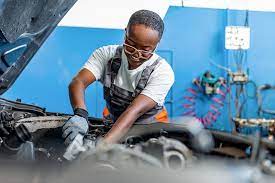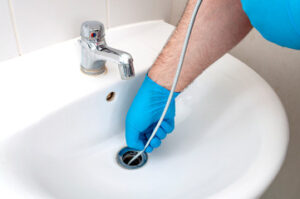Diesel Repair Kansas City technician has a broad skill set that allows them to service integrated systems within vehicles and equipment. They can also pursue additional credentials like National Institute for Automotive Service Excellence (ASE) and EPA Section 609 certifications to work on more specialized components such as vehicle air conditioning.

The internal combustion process that powers a diesel engine creates a lot of heat. This heat must be managed and dissipated effectively to prevent the engine from overheating, which would result in decreased power output and possible engine damage. The cooling system in a diesel engine provides the necessary means to do so.
The cooling system in a diesel engine consists of several components, including a radiator, water pump, coolant, and thermostat. The coolant circulating through the system absorbs heat from the engine cylinders and lube oil. This coolant then flows to the radiator, where it is cooled by air. Once the coolant reaches the radiator, it is returned to the engine to repeat the cycle. This helps the engine stay within its proper temperature range, ensuring optimal performance and a longer lifespan for the engine.
In addition to its primary function of cooling the engine, the coolant also works to keep the lubrication system in good condition. The coolant is filtered in the radiator to remove any contaminants that may have entered the system, as well as to protect against rust. The water pump is responsible for delivering coolant to the engine in the correct amount, which is determined by the thermostat. The water pump also pumps the coolant through a heat exchanger, which further cools the coolant to prevent overheating.
Overheating is the most common problem that can affect a diesel engine. This can be caused by a broken thermostat, blocked radiators, low coolant levels, or a buildup of grime inside the engine. Regularly monitoring the temperature gauge and looking for warning lights are the quickest ways to spot overheating issues.
Coolant can also be contaminated by abrasive dirt particles, so it is important to change the coolant regularly. This prevents the additives from becoming depleted, which can lead to liner cavitation and premature failure of the head gaskets, radiator, water pump, freeze plugs, heater core, and thermostat. A high-powered diesel engine is hard on the coolant, so it is important to check the additive level often with a coolant test strip and replace as needed.
Lubrication System
The lubrication system sends clean lubricating oil to the moving metal parts of your diesel engine. It reduces friction between these metal parts and absorbs a great deal of generated heat, allowing the engine to work smoothly.
The system also serves as a cooling system, and the oil circulates through the entire engine to help keep temperatures down. Additionally, it helps to clean the engine, moving dirt particles through a filter and into the oil pan. In a two-stroke engine, the oil also lubricates the pistons.
A typical lubricating oil system has an oil sump and one or more lubrication pumps. The pump is usually a positive displacement gear-driven pump that draws oil from the lube oil tank (sump) and supplies it to the engine during operation. An oil cooler keeps the lubricating oil at the right temperature, and there will be multiple filters to ensure that only clean, pure oil enters the engine.
These filtration systems are typically arranged in duplicate, so that if one becomes choked with debris or contaminants, the other is still able to function properly. The engine-lubricating oil is then pumped to the various engine parts through the proper branch pipes. An exhaust gas blowby system is sometimes added to the lubrication system, and this helps to lower the emission level of your engine.
Lastly, a safety device is often installed in the engine that constantly takes a sample of the air from inside the crankcase and compares it to oxygen in order to determine if the ratio of oxygen-to-oil vapour is too high and could potentially cause an explosion or fire. If the system detects such a condition, it will shut down the engine immediately.
The lubrication system on your diesel car or truck is crucial to the working efficiency and longevity of your vehicle. Paul’s Auto Repair has the expertise, tools, and knowledge to keep your engine running smoothly. Call us today for a world-class diesel experience.
Fuel System
The fuel system of a diesel engine is vital for ensuring that the correct amount of fuel is injected and burned to power the vehicle. Fuel issues can lead to decreased performance, engine damage and costly repairs. A properly functioning fuel system should be free of contaminants to ensure that the fuel is delivered correctly to the engine. Fuel treatments can help to eliminate these contaminants and keep the fuel system running smoothly.
A basic diesel fuel system consists of five essential components: the tank, fuel transfer pump, filters, injection pump and injection nozzles. The fuel tank holds the fuel and is usually crafted from aluminum alloys or steel to be both resistant to corrosion and durable enough to contain the fuel in high pressures. Fuel tanks are also designed to dissipate heat that is generated during the combustion process.
Before reaching the injection system, the diesel fuel undergoes a filtration process. The filter removes impurities and water from the fuel to prevent damage to the injection system. Filters can be single or two-stage and are capable of removing both large and small particles from the fuel.
Once the fuel is clean, it is pumped by the fuel transfer pump to the injection system. The injection system varies by vehicle but is typically either a mechanical or common rail fuel injection system. The mechanical injection systems are more traditional and used in older vehicles while the common rail systems are more modern and provide increased efficiency and power output.
A problem with the injection system can cause poor engine performance, stalling or inability to start. The injectors are responsible for spraying the diesel fuel into the combustion chamber and can experience issues such as clogs, leaks or improper firing. Inspecting the injectors with a multi-meter can reveal these problems and determine their condition.
The fuel injection system is a vital part of the diesel engine and can be damaged by the wrong fuel, contamination or age. Diesel fuel treatments can help to eliminate these contaminants and reduce the need for expensive repairs. A fuel treatment can also improve the performance of a diesel vehicle and increase its fuel economy.
Electrical System
A properly working electrical system is vital to the engine and other components aboard a boat. This system is comprised of a battery, alternator, starter motor, and electrical wiring and fuses that work together to power the entire vehicle. The battery stores energy, while the alternator generates electrical power to recharge it and power components. The starter motor transforms electrical energy into mechanical energy to crank the engine, which initiates fuel combustion.
The wiring provides a conduit for electricity to travel between the battery and component, with the fuses protecting circuits from excessive current. A circuit is a closed loop, and the flow of electrons (electric current) along its length is determined by the difference in voltage between the two points connected to it. The higher the voltage, the stronger the current; lower voltage, the weaker the current.
Conductors, which are typically made of copper, are used in electrical systems because of their high electrical conductivity and low cost. They are insulated with plastic or other synthetic materials, primarily to protect them from moisture. Electrical conductors are run through containment systems like circuit breaker panels, fuse blocks, and junction boxes to reduce the chance of short circuits.
If you have a battery that won’t hold a charge, a starter that won’t crank, or an alternator that won’t recharge, it could be due to corroded cables or dirty connections, and may require cleaning or replacement. It is important to use marine-grade cable with a proper wire gauge to ensure effective power transfer and minimize the chances of chafe or short circuits, especially around the engine.



